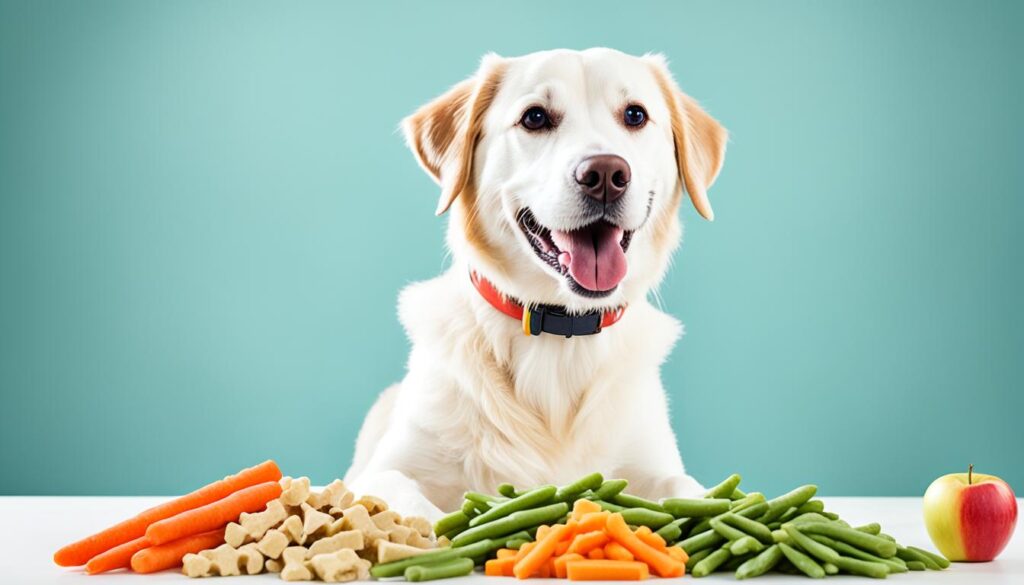As an Amazon Associate I earn from qualifying purchases.
Remember that time Fido gave you that irresistible puppy-dog look while you were enjoying a juicy, savory slice of ham? It’s hard to resist those pleading eyes, but when it comes to our furry friends, it’s crucial to prioritize their health and well-being. So, can dogs eat ham safely?
Well, it turns out that ham might not be the best treat for our canine companions. According to veterinarian experts and research from VetCompass, ham can pose significant health risks for dogs. From pancreatitis to steatorrhea and gastric dilation-volvulus (GVD), indulging your pup in ham can lead to a range of serious complications.
Pancreatitis, an inflammatory condition of the pancreas, can be triggered by the high fat content in ham and can be life-threatening for dogs. Steatorrhea, characterized by fatty stools, can also result from indulging in fatty ham. Quick ingestion of ham can increase the risk of GVD, a condition where the stomach twists, which can have fatal consequences if not promptly treated.
So, this Easter, while you’re enjoying your ham feast, it’s best to keep those delicious scraps away from your furry friend. The health complications simply aren’t worth it. Remember, your pup’s well-being should always come first.
Key Takeaways:
- Ham is not a safe treat for dogs, as it can lead to pancreatitis, steatorrhea, and GVD.
- Pancreatitis is a painful and life-threatening inflammation of the pancreas, while steatorrhea is characterized by fatty stools.
- GVD, also known as twisted stomach, can be caused by quick ingestion of ham.
- It is recommended to avoid feeding ham to dogs to prevent these health complications.
- There are safer alternatives for treats, such as lean meats, boiled eggs, and vegetables like carrots and green beans.
The Dangers of Fatty Ham for Dogs
Fatty ham can be a delicious indulgence for humans, but when it comes to our furry friends, it poses significant health risks. Feeding fatty ham to dogs can lead to various complications and should be avoided for their well-being.
One of the primary dangers of fatty ham is its potential to trigger pancreatitis in dogs. Pancreatitis is an inflammation of the pancreas that can be life-threatening for our canine companions. The high fat content in ham can overwhelm their digestive systems, causing severe inflammation and discomfort.
Another health concern associated with fatty ham is the risk of developing steatorrhea. This condition is characterized by the presence of fatty stools, which can be unsightly and may indicate poor digestion. Feeding dogs fatty ham can disrupt their digestive processes, leading to these unpleasant symptoms.
“Feeding your dog fatty ham can increase their risk of pancreatic inflammation and digestive issues.”
The quick ingestion of ham can also increase the risk of gastric dilation-volvulus (GVD) in dogs. GVD is a condition where the stomach twists upon itself, causing bloating and potentially cutting off blood supply to vital organs. It is a medical emergency that requires immediate treatment to prevent fatal consequences.
By avoiding the temptation to feed fatty ham to your four-legged companion, you can safeguard their health and well-being. Instead, opt for healthier alternatives that are safer for dogs.
Safe Alternatives to Fatty Ham
While dogs may not be able to enjoy fatty ham, there are plenty of other treats that can be equally delicious and much healthier for them.
| Treat | Description |
|---|---|
| Lean Meats | Chicken, turkey, and lamb are lean meats that can be cooked thoroughly and given to dogs in small amounts as treats, without any added spices or seasonings. |
| Raw Ham Bones | Larger dogs can enjoy raw ham bones for gnawing and dental health. Ensure the bones are raw and free of seasoning, as cooked bones can splinter and pose a choking hazard. |
| Boiled Eggs | Plain boiled eggs provide dogs with a protein-rich treat that is nutritious and safe. Remove the shell before giving it to your furry friend. |
| Carrots | Raw or cooked carrots can serve as a crunchy and low-calorie alternative to fatty ham. They are packed with vitamins and minerals that are beneficial for dogs. |
| Green Beans | Steamed or boiled green beans can be a satisfying treat for dogs. They are high in fiber and provide a healthy crunch. |
Remember, if you’re unsure about introducing a new treat to your dog’s diet, it’s always best to consult with your veterinarian. They can provide guidance based on your dog’s specific needs and help you make informed decisions to keep them happy and healthy.
Recommended Alternatives to Ham for Dogs
While ham should be avoided, there are plenty of safe alternatives that can be given to dogs as treats. Here are some tasty options:
- Lean Meats: Chicken, turkey, and lamb are great choices for dogs. Just make sure they are cooked without any spices or seasonings.
- Raw Ham Bones: Larger dogs can enjoy gnawing on raw ham bones, which can satisfy their natural instincts while promoting dental health. However, it is important to avoid giving raw ham itself, as it contains high amounts of salt.
- Boiled Eggs: Plain boiled eggs are a nutritious snack that dogs love. They are packed with protein and make for a convenient treat.
- Carrots: Whether raw or cooked, carrots are a crunchy and low-calorie option that dogs can enjoy. They are also good for their teeth.
- Asparagus: Cooked asparagus can be a healthy alternative to ham. Just be sure to cut it into small, bite-sized pieces for easy digestion.
- Green Beans: Green beans are another safe treat for dogs. They can be served cooked or raw and are rich in vitamins and fiber.
Remember, when introducing new foods to your dog’s diet, it’s always a good idea to consult with a veterinarian to ensure they are safe and appropriate.

With these safe alternatives, you can still treat your furry friend without putting their health at risk. So, next time you’re looking for a delicious snack to share with your dog, skip the ham and opt for one of these tasty and healthy options instead.
Other Easter Treats to Avoid for Dogs
While Easter is a time for indulging in sweet treats, it’s important to remember that not all of them are safe for your furry friends. Dogs have different dietary needs and certain foods can be toxic to them. Here are some Easter treats you should avoid giving to your dogs:
“Remember, dogs aren’t just cute, they’re counting on you to keep them safe this Easter!”
1. Chocolate

Chocolate is a major no-no for dogs. It contains theobromine and caffeine, which can be extremely toxic to them. Even small amounts of chocolate can cause vomiting, diarrhea, increased heart rate, seizures, and in severe cases, even death. So, resist those puppy eyes and keep the chocolate stash out of their reach!
2. Artificial Sweeteners
Many Easter candies, like jelly beans, contain artificial sweeteners such as xylitol. While harmless to humans, xylitol can be highly toxic to dogs. It can cause a sudden drop in blood sugar levels, leading to weakness, loss of coordination, seizures, and liver failure. Always double-check the labels and make sure that any sweets you offer your dogs are free of artificial sweeteners.
3. Grapes, Currants, and Raisins
Fruits like grapes, currants, and raisins should never be given to dogs. They can cause kidney failure, which can be life-threatening. Even a small amount can be harmful, so make sure to keep them away from your dog’s reach.
4. Table Scraps and Rich Foods
While it may be tempting to share your Easter feast with your dog, it’s important to steer clear of fatty, rich, and seasoned foods. These can cause indigestion, pancreatitis, and even gastrointestinal blockages. Stick to your dog’s regular diet and avoid letting them indulge in human food.
Remember, the best Easter treat you can give your dog is your love and attention. Instead of sharing potentially harmful treats, consider spending some quality time playing with them or going for a nice long walk. Your pup will appreciate it more than any chocolate egg!
Conclusion
As you prepare for the Easter celebrations, it’s important to keep your furry friends safe and healthy. While it may be tempting to share festive foods with them, like ham, it’s crucial to prioritize their well-being. Ham can pose serious risks to dogs, including pancreatitis, steatorrhea, and gastric dilation-volvulus (GVD). These conditions can be painful, potentially life-threatening, and lead to expensive vet bills.
But don’t worry, there are plenty of safe alternatives that you can offer to your four-legged companions. Lean meats such as chicken, turkey, and lamb can be served in small amounts, as long as they are cooked without any spices or seasonings. Boiled eggs, carrots, and green beans are also dog-friendly treats that can add some variety to their diet.
It’s not just ham that you should be cautious about during Easter. There are other treats that can be harmful to dogs. Chocolate is especially toxic and can cause a range of symptoms, including vomiting, diarrhea, seizures, and even death. Keep an eye out for other candies that contain artificial sweeteners, colors, and flavors that can also be toxic to dogs. Avoid feeding them currants, raisins, grapes, as well as artificial sweeteners like xylitol.
By following these guidelines and making informed choices, you can ensure that your furry friends have a safe and enjoyable Easter celebration. Remember, their well-being should always be a priority, even during the holidays. So, keep those Easter treats out of their reach and opt for dog-friendly alternatives. Wishing you and your beloved dogs a happy and healthy Easter!
FAQ
Can dogs eat ham?
What are the health risks of feeding ham to dogs?
What alternatives can I give to my dog instead of ham?
Are there any other Easter treats that I should avoid giving to my dog?
Why is it important to keep dogs away from certain Easter treats?
Source Links
- https://holidaybarn.com/blog/easter-food-for-your-dog/
- https://www.sydney.edu.au/news-opinion/news/2017/12/06/three-reasons-you-shouldn-t-feed-christmas-ham-to-your-dog.html
- https://salumipasini.com/en/can-dogs-eat-cooked-ham/
As an Amazon Associate I earn from qualifying purchases.

